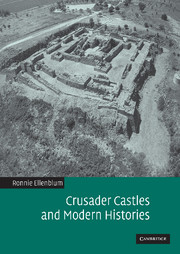Book contents
- Frontmatter
- Contents
- List of illustrations
- List of tables
- Acknowledgements
- Part I National discourse and the study of the Crusades
- Part II Crusader studies between colonialist and post-colonialist discourse
- Part III Geography of fear and the spatial distribution of Frankish castles
- Part IV The castle as dialogue between siege tactics and defence strategy
- Conclusion
- Appendix
- Bibliography
- Author index
- Subject index
Conclusion
Published online by Cambridge University Press: 29 July 2009
- Frontmatter
- Contents
- List of illustrations
- List of tables
- Acknowledgements
- Part I National discourse and the study of the Crusades
- Part II Crusader studies between colonialist and post-colonialist discourse
- Part III Geography of fear and the spatial distribution of Frankish castles
- Part IV The castle as dialogue between siege tactics and defence strategy
- Conclusion
- Appendix
- Bibliography
- Author index
- Subject index
Summary
Almost two hundred years have elapsed since the Académie Française began to define anew the role and importance of the Crusades in European history, thus beginning the process of their rehabilitation. Two centuries later it is a matter of fact that the Crusades are no longer considered to have been a negative and immoral phenomenon; in many respects they have even become a source of pride.
This profound conceptual transformation cannot be attributed only to the Romantic movement and the new ideas promoted by the French Revolution. A deeper turn in the conceptualisation of the Crusades occurred much later, in the 1830s, when the narrative of the Crusades was appropriated by many of the nascent national movements, becoming an inseparable component of the nationalist and colonialist discourses. Until the 1830s, all the studies of the Crusades (including those written by the participants in the Académie Française's competition) viewed them as a pan-European episode that could not be attributed to a specific nation. But from the beginning of the 1830s onwards, nationalist and colonialist interpretations of the Crusades became the rule of the day, in effect holding sway up to this very day.
The date of this change can be pinpointed: it came about when the French scholar Joseph-François Michaud, a royalist and a devoted Catholic, set out on a pilgrimage to the Holy Land. In the port of Toulon he chanced upon the huge fleet about to set sail to attack and capture Algeria.
- Type
- Chapter
- Information
- Crusader Castles and Modern Histories , pp. 287 - 304Publisher: Cambridge University PressPrint publication year: 2007



